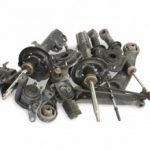How Much Is My Car Worth?
How much is my car worth? is a difficult question for auto recycling facilities like ourselves; it’s like asking how much a house is worth or asking a doctor to tell you exactly how healthy you are or aren’t. It is a quantitative question that can only be answered by analyzing a myriad of factors. Understanding how much a car is worth is like a doctor telling you how healthy you are by aggregating your BMI, cholesterol, blood-glucose levels, your bone density and a plethora of other measurable factors that create your overall health. This is similar to how you figure out how much your car is worth. Important factors when it comes to ‘how much my car is worth?’ and assigning an overall value to your car, we analyze a number of factors in order to assign a value:
Blue Book Value
Blue book value of a vehicle doesn’t mean much to us. Lots of cars might hold their value on the used market, but if we don’t have any history on the parts, it’s only worth its value in scrap to us. This happens often, someone thinks they can sell their car for $2000 on kijiji but we only offer them $300 and they get insulted. The problem is that the car might be 10-12 years old and in good running condition but we won’t sell any parts off of it. This is why I want to stay away from anything to do with the blue book.
If you’re familiar with cars then you know the Kelly Blue Book. This book categorizes cars by make, model and year, and then gives their depreciating value, year after year. This book is the standard measuring stick we use, however it is more a guideline than an actual car-value bible.
Type of Vehicle
Certain types of vehicles retain their value better than others, and this is generally based on the make and model of the car—and how many people are still repairing that model. For example, Ford F150 truck owners tend to repair those until the truck’s last dying breath—so F150s are retain their value better than truck makes that aren’t repaired for as long. Also, certain car brands and models tend to be repaired for years longer than other models, especially Honda’s and Toyota’s. Some other makes, in comparison, are often considered more ‘disposable’ by their owners so they have a lower demand for parts—and therefore a lower value over time.
Condition
If your car looks like it was run over by a monster truck, it obviously won’t carry the value indicated in the Blue Book. If there is rust it will lower the value, if the parts are not in good condition or the car does not run—all of these things will affect the value. When it comes to determining the value of a car you also need to consider its age, mileage and current body and parts condition. If the car is no longer working, or would cost more to fix than its Blue Book price then it may simply be sold for scrap, and will therefore be worth the value of the weight of its scrap metal. If your car is no longer running but its parts have value then it can be ‘scrapped’ for parts instead of for scrap metal.
So—How Much is MY Car Worth?
If you want a simple, straight-forward answer—then just give us a call here at Logel’s. We’ll give you a no-nonsense assessment of your car’s value.






